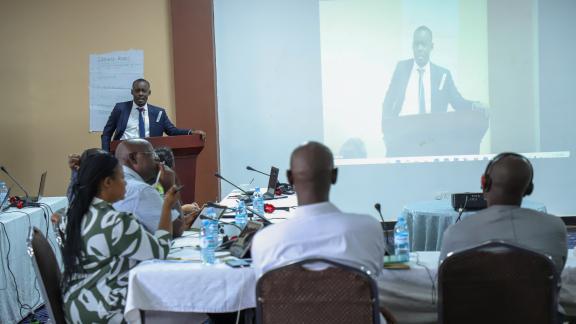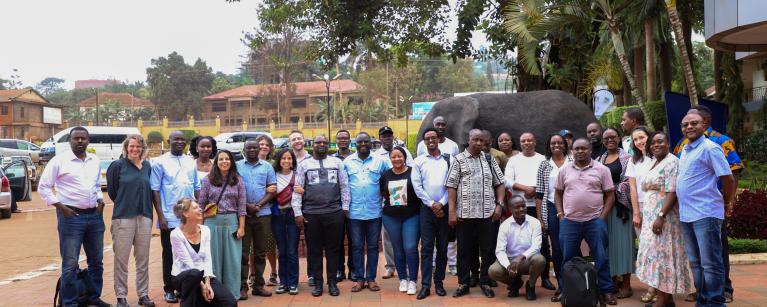In October, Oxfam in Uganda hosted the regional Just Energy Transition (JET) workshop in Kampala. Over fifty participants came from Oxfam affiliates and partners working in energy transition across the continent.
Energy transition refers to the global energy sector’s shift from fossil-based systems of energy production and consumption- including oil, natural gas, and coal to renewable energy sources like solar and wind.
Speaking at the JET workshop, Mr. Herbert Abigaba, the Principal Energy Officer at the Ministry of Energy and Mineral Development, in his Keynote address at the workshop examined Uganda’s Approach to Energy Transition vis-à-vis the Oil & Gas Extraction amidst the current Global Climate Crisis.
"Uganda is one of the countries that have an energy transition plan launched in 2023," he said.
He also acknowledged the disparity in energy access and cooking practices among the population, as highlighted by the recent Census, which indicated that while 53% of the population has energy access, 90% still uses traditional biomass.
Abigaba also highlighted Uganda's commitment to energy access and sustainability, rooted in the 1995 Constitution, which mandates the promotion of energy policies that satisfy basic needs while preserving the environment.

Mr. Herbert Abigaba, the Principal Energy Officer at the Ministry of Energy and Mineral Development speaking at the Just energy workshop in Kampala
Uganda’s emissions profile shows that over 80% of emissions stem from agriculture, forestry, and other land use, contrasting with developed nations where energy accounts for most emissions.
Abigaba highlighted the work being done by the Ugandan government to transition to cleaner energy sources.
“The government aims to transition from unsafe cooking methods to clean energy through initiatives like the National Electrification Strategy (NES) and the energy transition framework while leveraging revenues from oil and gas to finance the shift to green energy.
Speaking at the event, Francis Shanty Odokorach, Oxfam’s Country Director, spoke about the need to urgently address climate change by supporting the transition to cleaner energy.
“The issue of climate change is a human rights issue and thus should be treated with importance." He said.
During the workshop, which included country teams from all over the continent, including Zambia, Malawi, Zimbabwe, Nigeria, Kenya, and Mozambique, participants presented the different efforts their countries are making to transition to cleaner forms of energy.
Florence Gichoya, a representative from the Alliance of Civil Society Organizations for Clean Energy (Access Coalition) that works with Oxfam in Kenya, shared that they’d supported county leaderships like that of Meru and Kitui to develop county energy plans that advance the goal of energy transition also mentioning that the organization has had learning exchanges in July to find ways to work with government and leadership structures.
Across the continent, the different affiliate partners recognized the fact that they face a unique set of climate change challenges ranging from extremes of drought, flooding, and inconsistent rainfall and made the commitment to advocate for climate financing as COP29 draws closer.
Africa accounts for only 3.9% of the global carbon emissions but continues to suffer from the adverse effects of climate change, a statistic that informed discussion at the workshop with the view that the global north, which accounts for half of the world's carbon emissions should commit more finance to support the mitigation and adaptation efforts of the global south countries.
“We continue to face a lot of colossal damages as a result of climate change, and therefore, we need an ambitious goal for climate change that will be able to finance adaptation and mitigation,” said Jackson Muhindo, Oxfam in Uganda’s Climate Justice Coordinator, adding that financing should be made available to the global south countries to help them respond to climate change.
